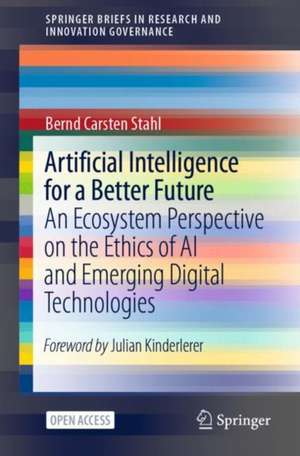Artificial Intelligence for a Better Future: An Ecosystem Perspective on the Ethics of AI and Emerging Digital Technologies: SpringerBriefs in Research and Innovation Governance
Autor Bernd Carsten Stahlen Limba Engleză Paperback – 18 mar 2021
This open access book proposes a novel approach to Artificial Intelligence (AI) ethics. AI offers many advantages: better and faster medical diagnoses, improved business processes and efficiency, and the automation of boring work. But undesirable and ethically problematic consequences are possible too: biases and discrimination, breaches of privacy and security, and societal distortions such as unemployment, economic exploitation and weakened democratic processes. There is even a prospect, ultimately, of super-intelligent machines replacing humans. The key question, then, is: how can we benefit from AI while addressing its ethical problems?
This book presents an innovative answer to the question by presenting a different perspective on AI and its ethical consequences. Instead of looking at individual AI techniques, applications or ethical issues, we can understand AI as a system of ecosystems, consisting of numerous interdependent technologies, applications and stakeholders. Developing this idea, the book explores how AI ecosystems can be shaped to foster human flourishing. Drawing on rich empirical insights and detailed conceptual analysis, it suggests practical measures to ensure that AI is used to make the world a better place.
Preț: 223.51 lei
Preț vechi: 279.39 lei
-20% Nou
Puncte Express: 335
Preț estimativ în valută:
42.78€ • 46.49$ • 35.96£
42.78€ • 46.49$ • 35.96£
Carte tipărită la comandă
Livrare economică 21 aprilie-05 mai
Preluare comenzi: 021 569.72.76
Specificații
ISBN-13: 9783030699772
ISBN-10: 3030699773
Ilustrații: X, 124 p. 15 illus. in color.
Dimensiuni: 155 x 235 mm
Greutate: 0.2 kg
Ediția:1st ed. 2021
Editura: Springer International Publishing
Colecția Springer
Seria SpringerBriefs in Research and Innovation Governance
Locul publicării:Cham, Switzerland
ISBN-10: 3030699773
Ilustrații: X, 124 p. 15 illus. in color.
Dimensiuni: 155 x 235 mm
Greutate: 0.2 kg
Ediția:1st ed. 2021
Editura: Springer International Publishing
Colecția Springer
Seria SpringerBriefs in Research and Innovation Governance
Locul publicării:Cham, Switzerland
Cuprins
Preface.- 1 Introduction.- 2 Artificial Intelligence and Other Emerging Technologies.- 3 The Ethics of AI.- 4 Mitigation Measures.- 5 An AI Ecosystem for Human Flourishing.- 6 Conclusion.- 7 Index.
Recenzii
“Current efforts are identified and classified into categories in a very interesting chart. ... The book is very current and well written. Every chapter has extensive references.” (David A. Gustafson, Computing Reviews, December 21, 2021)
Notă biografică
Bernd Carsten Stahl is Professor of Critical Research in Technology and Director of the Centre for Computing and Social Responsibility at De Montfort University, Leicester, UK. His interests cover philosophical issues arising from the intersections of business, technology, and information. This includes ethical questions of current and emerging of ICTs, critical approaches to information systems and issues related to responsible research and innovation.
Textul de pe ultima copertă
This open access book proposes a novel approach to Artificial Intelligence (AI) ethics. AI offers many advantages: better and faster medical diagnoses, improved business processes and efficiency, and the automation of boring work. But undesirable and ethically problematic consequences are possible too: biases and discrimination, breaches of privacy and security, and societal distortions such as unemployment, economic exploitation and weakened democratic processes. There is even a prospect, ultimately, of super-intelligent machines replacing humans. The key question, then, is: how can we benefit from AI while addressing its ethical problems?
This book presents an innovative answer to the question by presenting a different perspective on AI and its ethical consequences. Instead of looking at individual AI techniques, applications or ethical issues, we can understand AI as a system of ecosystems, consisting of numerous interdependent technologies, applications and stakeholders. Developing this idea, the book explores how AI ecosystems can be shaped to foster human flourishing. Drawing on rich empirical insights and detailed conceptual analysis, it suggests practical measures to ensure that AI is used to make the world a better place.
Caracteristici
Offers a novel conceptualisation of the AI ethics debate by applying the discourse of innovation ecosystems to AI Practice-oriented with an aim to give stakeholders and decisions makers conceptually sound and empirically rich ways of dealing with the ethics of AI Provides novel empirical insights into the way AI ethics is perceived and dealt with in organisational and social practice, based on case studies, scenarios, a Delphi study, and a large-scale survey Introduces a practical approach to AI ethics, based on established methods of responsible research and innovation and the well established ethical principle of human flourishing Includes supplementary material: sn.pub/extras








